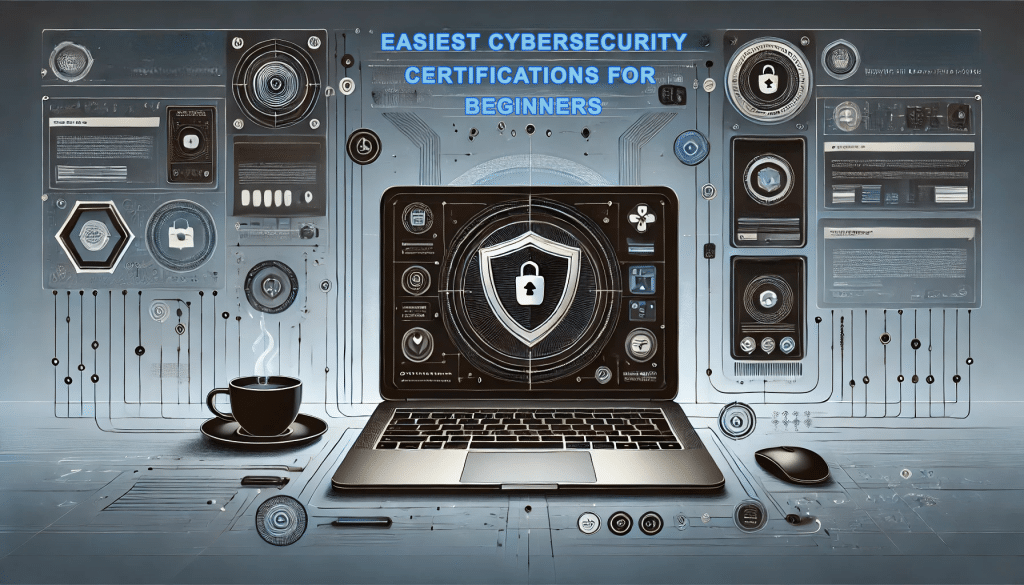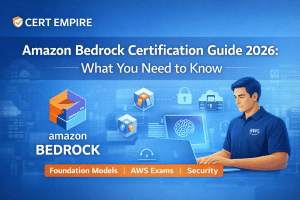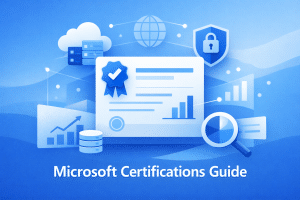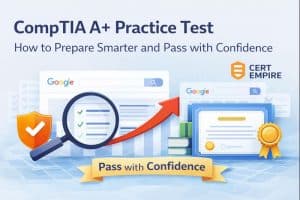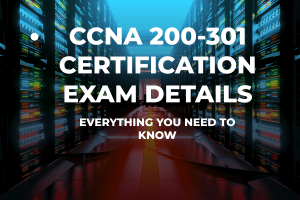Getting into cybersecurity might seem like a big leap, especially if you’re just starting out. You’ve probably heard about all the technical skills and experience needed, which can feel overwhelming.
There are certifications out there designed specifically for beginners, programs that teach you the basics, give you confidence, and make the whole process a lot less scary. These certifications are like your starting point, helping you build a foundation without drowning you in jargon or advanced concepts.
Let’s discuss the easiest cybersecurity certifications for beginners. Whether you’re curious about the field or ready to take your first step toward a cybersecurity career, these certifications are perfect for getting your foot in the door.
Executive Summary
| Certification Name | Target Audience | Focus Areas | Difficulty Level | Time to Prepare | Career Opportunities |
| CompTIA Security+ | Beginners with no prior experience | Threats, network security, cryptography, compliance, and incident response | Beginner to Moderate | 6–8 weeks | Security Analyst, IT Support, Systems Administrator |
| Certified Cybersecurity Technician (CCT) | Hands-on learners new to cybersecurity | Network fundamentals, endpoint protection, incident response | Beginner | 4–6 weeks | Junior Cybersecurity Analyst, IT Support Specialist |
| Certified Ethical Hacker (CEH) Practical | Aspiring ethical hackers | Vulnerability scanning, ethical hacking tools, penetration testing basics | Moderate | 6–10 weeks | Penetration Tester, Security Consultant |
| (ISC)² Certified in Cybersecurity (CC) | Absolute beginners | Security principles, access control, risk management, incident response | Beginner | 4–6 weeks | Junior Analyst, IT Support Technician, Security Admin |
| Cybersecurity Fundamentals Certificate (ISACA) | Those new to cybersecurity, interested in GRC | Cybersecurity concepts, risk assessment, incident response, governance | Beginner | 3–5 weeks | Governance, Risk, and Compliance (GRC) roles |
| GIAC Security Essentials (GSEC) | Beginners ready for deeper technical learning | Network security, cryptography, endpoint security, incident handling | Beginner to Intermediate | 8–12 weeks | Security Administrator, SOC Analyst, Systems Analyst |
Top Entry-Level CyberSecurity Certifications in Cybersecurity
When people hear “cybersecurity certification,” they often imagine grueling tests full of complex jargon. But not all certs are like that. Some are designed for absolute beginners, folks who’ve got zero experience but plenty of curiosity. These certs aren’t just easy to tackle, they also align with what the industry needs right now, making them a practical first step for anyone looking to break into cybersecurity.
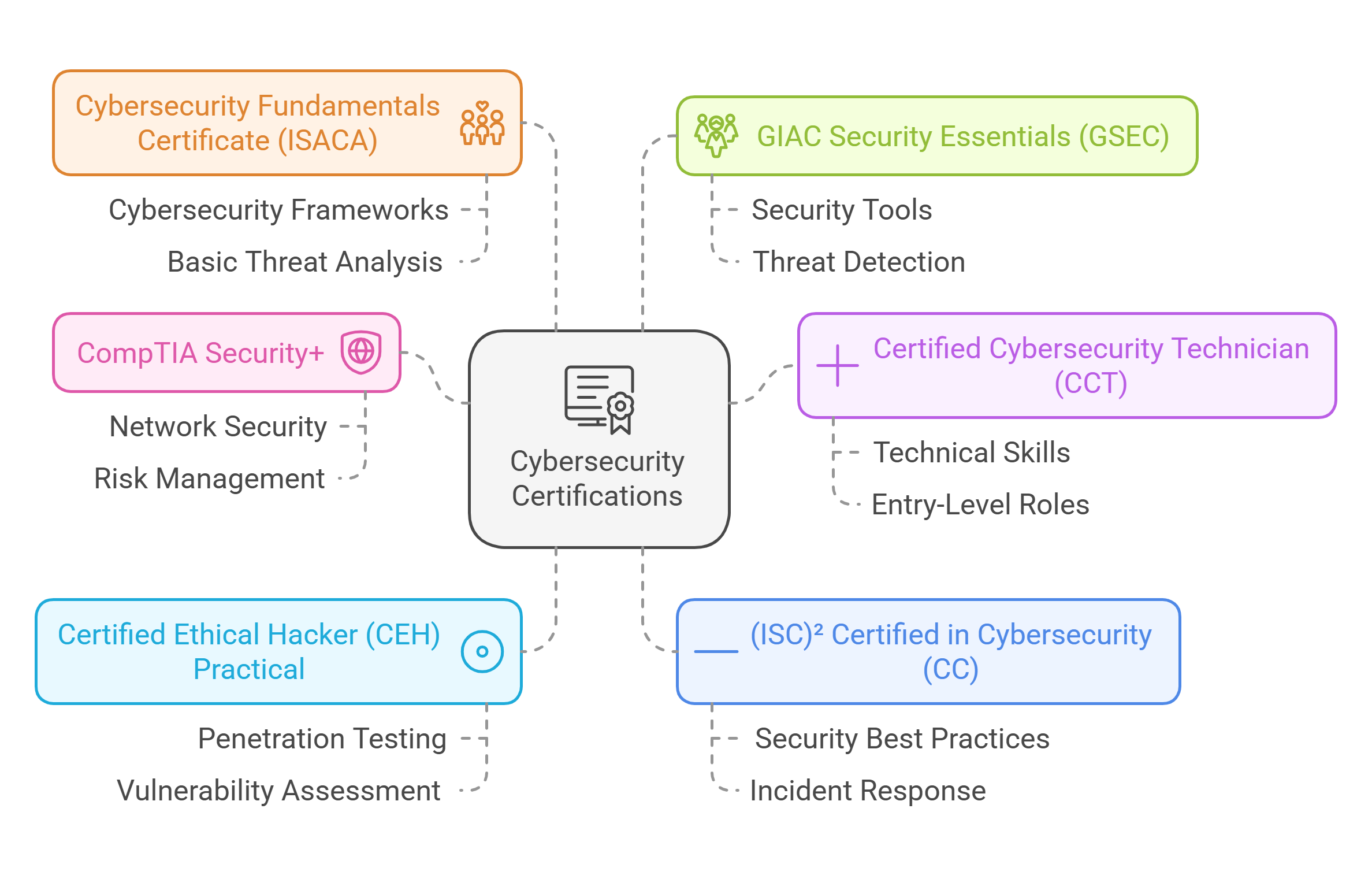
Let’s dive into the options and understand what makes these beginner-friendly certs truly accessible.
1- CompTIA Security+: The Starting Point for Many
CompTIA Security+ is a favourite among beginners for good reason, it’s one of the most recognized cybersecurity certifications out there. If you’re starting your journey in this field, Security+ is like a guidebook that introduces you to essential concepts without getting too technical.
It’s comprehensive enough to give you confidence but not so complex that you’ll feel lost. Think of it as learning the alphabet before writing a full sentence—simple but vital.
What You’ll Learn
Security+ focuses on building a solid foundation in cybersecurity. Here’s what you can expect to learn:
- Identifying and Handling Threats: Understand different types of cyber threats and how to mitigate them.
- Basic Cryptography: Learn how encryption protects sensitive information and ensures data integrity.
- Network Security: Discover how to secure networks and prevent unauthorized access.
- Incident Response and Compliance: Learn how to handle security incidents and align with regulations.
These are the bread-and-butter skills of cybersecurity. What makes Security+ stand out is its practical focus, you’ll be learning stuff you’ll actually use on the job. For a more in-depth look at the SY0-701 exam, check out this comprehensive guide: https://certempire.com/comptia-sy0-701-exam-guide/
Exam Structure and Tips
The Security+ exam consists of 90 questions, a mix of multiple-choice and performance-based tasks. The latter tests your ability to apply knowledge in real-world scenarios, making it more engaging and less about rote memorization. You have 90 minutes to complete the test, and a score of 750 out of 900 is required to pass. Use these tips:
- Use official CompTIA resources or well-reviewed study guides.
- Take multiple practice exams to familiarize yourself with the question style.
- Focus on performance-based questions; they mirror real-world challenges.
Career Opportunities
With Security+, you can pursue roles like:
- Security Analyst: Monitor and defend against threats.
- Systems Administrator: Ensure systems are secure and running smoothly.
- IT Support Specialist: Provide technical support with a security focus.
Entry-level salaries for these positions are solid, and Security+ often meets the minimum certification requirement for many employers.
Starting with easier certifications is smart, but planning your long-term roadmap matters too. Our list of the top cybersecurity certifications for 2026 shows which credentials are most valuable for building a solid career path.
2- Certified Cybersecurity Technician (CCT): A Lesser-Known Gem
The Certified Cybersecurity Technician (CCT) might not be as well-known as Security+, but don’t let that fool you. It’s an incredibly practical cert, perfect for those who prefer hands-on learning. Instead of overwhelming you with endless theory, CCT helps you understand the nuts and bolts of cybersecurity, ideal if you’re a hands-on learner.
What You Will Learn
CCT dives into essential topics without overloading you with unnecessary details. Here’s a taste of what you’ll cover:
- Network Fundamentals: Learn the basics of how networks work and how to secure them.
- Endpoint Protection: Understand how to secure devices like laptops, phones, and servers.
- Incident Response: Develop the skills to handle and mitigate security breaches effectively.
CCT focuses on the “why” as much as the “how,” helping you understand the reasoning behind security practices. This approach makes it easier to grasp concepts and apply them later.
Exam Overview and Prep Resources
The CCT exam is shorter than most entry-level certifications, making it less intimidating. The questions stick to what you’ve studied, with no tricky surprises.
- Study Materials: Look for interactive labs and video tutorials, as these help you retain information better.
- Time Investment: Around 30–40 hours of focused study should be enough for most beginners.
What’s Next After CCT?
CCT is an excellent stepping stone, whether you want to explore advanced certifications like CEH or specialize in areas like penetration testing. Career-wise, it opens doors to roles like:
- Junior Cybersecurity Analyst: Focus on identifying and mitigating threats.
- IT Support Specialist: Handle support tasks with a cybersecurity angle.
3- Certified Ethical Hacker (CEH) Practical: Learn by Doing
The Certified Ethical Hacker (CEH) cert is well-known, but its Practical version is a game-changer for beginners. Unlike traditional exams that rely on theoretical knowledge, CEH Practical is all about hands-on experience. If you’ve ever wanted to feel like a hacker (a good one, of course), this is the cert for you.
Skills You’ll Build
With CEH Practical, you’re not just learning concepts, you’re doing the work. Here’s what you’ll master:
- Vulnerability Scanning: Learn to spot weak points in systems and networks.
- Ethical Hacking Tools: Use industry-standard tools to test security defenses.
- Penetration Testing Basics: Simulate real-world attacks to evaluate system security.
This cert is ideal for beginners interested in ethical hacking or penetration testing, as it offers practical, real-world skills from day one.
Exam Structure
The CEH Practical exam isn’t your typical multiple-choice test. Instead, it’s task-based, meaning you’ll be solving real challenges in a virtual lab. This format tests your ability to think and act like an ethical hacker, rather than just memorize answers.
Example Tasks You Might Face:
- Identifying vulnerabilities in a network.
- Using tools like Metasploit or Wireshark.
- Conducting basic penetration tests.
Why It’s Beginner-Friendly
While CEH Practical is slightly more challenging than CCT or Security+, it’s still beginner-accessible because of its hands-on approach. You’re not just learning theory—you’re applying it, which makes the concepts stick. Plus, having CEH Practical on your resume is a big deal, especially if you’re aiming for roles like Penetration Tester or Security Consultant.
4- (ISC)² Certified in Cybersecurity (CC)
The (ISC)² Certified in Cybersecurity (CC) is one of the easiest and most accessible certs for newcomers. Why? Because it’s designed with absolute beginners in mind. You don’t need prior experience or advanced knowledge to understand the content or pass the exam. It focuses on building your awareness of cybersecurity fundamentals, making it a perfect choice if you’re just starting to explore the field.
What You’ll Learn
This cert acts like a crash course in cybersecurity basics. Key areas covered include:
- Security Principles: Understanding why cybersecurity is essential and how it protects organizations.
- Access Control Concepts: Learning the basics of managing and securing user access to systems.
- Risk Identification and Management: Spotting vulnerabilities and understanding how to handle them.
- Incident Response: Knowing what steps to take when a security breach occurs.
Exam Format and Prep
The exam is straightforward, consisting of multiple-choice questions that test your understanding of foundational topics. The great thing about this cert is the availability of free and low-cost prep materials from (ISC)² itself, including online courses and practice questions. Most people find they can prepare in about 30-40 hours of study.
Career Opportunities
This certification alone won’t land you a senior role, but it’s an excellent way to prove your interest and basic knowledge. Employers see it as a sign you’re serious about cybersecurity, making it a solid stepping stone toward roles like Junior Analyst, IT Support Technician, or Security Administrator.
If you’re considering the (ISC)² Certified in Cybersecurity (CC) certification, understanding its full potential and how it fits into the broader cybersecurity landscape can help you make informed career decisions. From exam preparation to job opportunities, having a clear roadmap can guide your journey in leveraging this certification effectively
5- Cybersecurity Fundamentals Certificate (ISACA)
ISACA is a well-known name in cybersecurity, and their Cybersecurity Fundamentals Certificate is tailored for people with no prior experience. It’s built to teach you the core concepts without overwhelming you, offering a solid introduction to the field.
What You’ll Learn
This cert focuses on five key areas:
- Cybersecurity Concepts: The basic terminology, threats, and practices you’ll need to know.
- Threat Identification: How to spot common security risks and understand their impact.
- Risk Assessment: Learning how to evaluate risks and prioritize them effectively.
- Incident Response: Developing a basic understanding of how to handle security events.
- Governance: The importance of policies and procedures in managing cybersecurity.
The emphasis here is on creating a well-rounded understanding of cybersecurity without diving too deep into technical details.
Exam Format and Study Tips
The exam is relatively short and consists of multiple-choice questions. It’s designed to test your grasp of key concepts rather than trip you up with tricky questions. Study guides, video tutorials, and practice exams are widely available, making preparation straightforward. Dedicate around 20-30 hours to studying, and you should be good to go.
Career Benefits
This cert is great for building your resume and showing employers that you’re serious about cybersecurity. It’s especially useful if you’re looking to work in governance, risk, and compliance (GRC) roles, as it gives you a solid introduction to these areas.
6- GIAC Security Essentials (GSEC)
The GSEC is a bit more challenging than the previous two certifications, but it’s still beginner-friendly. It’s ideal for people who want to combine theoretical knowledge with practical skills. Unlike other entry-level certs, the GSEC dives deeper into security concepts, making it a good fit if you’re ready to put in a little extra effort to stand out.
What You’ll Learn
The GSEC covers a wide range of topics, including:
- Network Security: Learning how to secure networks and prevent unauthorized access.
- Cryptography Basics: Understanding how encryption protects sensitive data.
- Endpoint Security: Managing and securing devices connected to a network.
- Incident Handling: Steps to respond effectively to cybersecurity incidents.
- Access Control and Authentication: The nuts and bolts of managing user permissions securely.
This cert focuses not just on what cybersecurity is, but also on how to apply the knowledge in real-world situations.
Exam Format and Preparation
The GSEC exam includes 180 questions, which you’ll have five hours to complete. It’s more extensive than the CC or ISACA Fundamentals exams, but the questions are fair and based on your studies. Prep resources include official training courses, books, and practice tests. You’ll likely need around 50-60 hours of study time to feel fully prepared.
Who Should Consider the GSEC
If you’re willing to invest a little more time in preparation, the GSEC is a fantastic cert for building a stronger skill set. It’s ideal for beginners who want to understand both the theory and practical side of cybersecurity.
Career Pathways
With the GSEC, you’ll be qualified for entry-level roles like Security Administrator, Systems Analyst, or SOC Analyst. It’s also an excellent stepping stone to more advanced certs like the CISSP or CISM. If you’re considering pursuing the CISSP, having a solid preparation strategy is crucial for success. Check out this comprehensive guide to ace the CISSP on your first attempt.
Why Vendor-Specific Certifications Can Be Surprisingly Easy?
Some vendor-specific certs, like Microsoft Security, Compliance, and Identity Fundamentals, or Google’s Cybersecurity Certification, are beginner-friendly because they focus on a specific ecosystem.
These certs are often shorter and more focused, which makes them easier to tackle. Plus, they’re great if you’re interested in working with specific platforms.
What Makes a Certification “Easy”?
“Easy” is a relative term. For certifications, it doesn’t mean no effort, but rather that the material is straightforward, the prep time is manageable, and you don’t need years of tech experience to succeed. Certifications aimed at beginners usually:
- Focus on foundational knowledge (like basic security concepts or threat identification).
- Avoid requiring deep technical expertise or coding skills.
- Offer plenty of study resources, practice tests, and community support.
These certs are built to give you a head start, not to trip you up. They’re great for understanding cybersecurity basics and showing employers that you’re serious about starting your career in the field.
If you want to see how these beginner-friendly certs connect to long-term growth, our complete cybersecurity career path guide maps out how each step can lead to advanced roles and higher salaries.
How to Decide on the Best Cybersecurity Certification for You?
When you’re just starting out in cybersecurity, picking the right certification can feel like trying to solve a puzzle without all the pieces. There are so many certs out there, and each one promises something different. The trick isn’t just to grab the most popular one, it’s about finding the cert that matches your goals, learning style, and resources.
Let’s break it down so you can make a choice that works for you, not against you.
What Are You Aiming For?
Your career goals should steer the ship here. Are you looking to land a specific role, or are you just testing the waters to see if cybersecurity clicks for you? Different certs pave the way for different paths, so it helps to think about where you want to go.
- If You’re Exploring the Basics: Go for beginner-friendly certs like CompTIA Security+ or (ISC)² Certified in Cybersecurity (CC). These give you a taste of the field without overwhelming you.
- If You’re Aiming for a Hands-On Role: Certs like CEH Practical or CCT are ideal. They focus on actionable skills that are directly useful on the job.
- If You Have a Specific Job in Mind: Look up the common requirements for that role. For example, Security Analyst positions often list Security+ as a preferred certification.
Think About Time Commitment
Let’s be real: some certifications require months of study, while others can be tackled in a few weeks. The question is, how much time do you have to dedicate?
- Short and Sweet Options: Certs like the Cybersecurity Fundamentals Certificate (ISACA) or (ISC)² CC can be prepped for in a few weeks, making them perfect for fast learners or those with limited time.
- More Intensive Certs: If you’re ready to invest more hours, go for something like Security+ or GSEC. These require a bit more effort but offer broader knowledge.
If you’re juggling work or other responsibilities, pick a cert that fits your schedule. A cert isn’t worth burning out over.
Cost Matters More Than You Think
Let’s face it—cybersecurity certs can get expensive. And while you’re just starting, you don’t want to drop a fortune on something you’re not even sure about yet.
- Affordable Certs: Security+ and (ISC)² CC are relatively budget-friendly, especially when you consider their value in the job market.
- Hidden Costs: Remember, it’s not just the exam fee. Factor in study materials, practice tests, and even rescheduling fees. Some certs, like CEH, can rack up costs quickly if you’re not careful.
- Pro Tip: Check if your employer offers reimbursement or if there are scholarships available. Some organizations are eager to support beginners in cybersecurity.
Your Learning Style Makes a Big Difference
Ever tried forcing yourself to learn in a way that just doesn’t click? Yeah, it doesn’t work. Your learning style plays a big role in choosing a cert.
- Visual and Hands-On Learners: Certs like CEH Practical and CCT are gold. They focus on interactive labs and real-world scenarios.
- Bookworms: If you’re someone who loves to read and study at your own pace, Security+ or GSEC might be a better fit. They offer plenty of reading material to dive into.
- Hybrid Approach: Some people need a mix—videos, labs, and books. Look for certifications with flexible resources so you can switch things up when you get bored.
Ask Yourself: Do You Want Easy or Impactful?
Let’s clear up one thing: the “easiest” certification isn’t always the best choice. Sure, it might get you started, but does it align with your career goals? Sometimes putting in a little extra effort now can save you headaches later.
- The Easy Path: If you’re just testing the waters, start with something like (ISC)² CC or ISACA Cybersecurity Fundamentals. They’re straightforward and beginner-friendly.
- The Smart Investment: If you’re ready to commit, go for Security+. It’s not the easiest cert, but it’s one of the most widely recognized and opens up more doors.
The Learning Format: In-Person or Online?
This one’s personal. Some people thrive in classroom settings, while others prefer the flexibility of online learning. Certifications often come with multiple prep options, so think about what works for you.
- Online Learning: Most beginner certs offer great online prep courses. Platforms like Coursera, Udemy, or even official certification providers have video lessons, quizzes, and practice tests.
- In-Person Classes: If you need accountability or a structured schedule, in-person classes might be worth the investment.
- Self-Paced Study: If you’re disciplined, study guides and practice exams are often enough for entry-level certs.
What If You’re Still Unsure?
If you’re still scratching your head, don’t stress. Try talking to people already in the field. Join forums or LinkedIn groups and ask for advice. Sometimes hearing about someone else’s journey can make your own path clearer.
Once you’ve mastered the basics, you may want to challenge yourself with advanced credentials, check out our breakdown of the hardest cybersecurity certifications that truly test the limits of skill and endurance.
Tools and Resources to Simplify Your Cybersecurity Journey
Getting started in cybersecurity doesn’t have to be complicated or expensive. With the right tools and resources, you can set yourself up for success without emptying your wallet. Whether you’re preparing for your first certification or looking for guidance, there’s plenty out there to help.
Let’s break down the essentials that can make your learning experience smoother and more effective.
Free and Affordable Study Materials for Entry-Level Certs
If you’re on a tight budget, don’t worry. There are tons of free or low-cost resources to kickstart your learning. Many certification providers and educational platforms offer high-quality material without charging a fortune.
Here’s where to look:
Official Resources from Cert Providers
Most cert organizations, like CompTIA or (ISC)², provide free or affordable study guides, practice questions, and webinars. For example:
- CompTIA offers its CertMaster Learn platform, which is packed with practice tests, flashcards, and detailed lessons.
- (ISC)² often has free self-paced training for their entry-level Certified in Cybersecurity (CC) cert.
Free eBooks and PDFs
A quick search can lead you to free cybersecurity eBooks covering topics like network security, cryptography, and incident response. Many vendors also release free downloadable guides, especially around popular certifications like Security+.
YouTube Channels
Sometimes, the easiest way to learn is by watching someone explain it in plain terms. Channels like Cyber Mentor, ITProTV, and Network Chuck have beginner-friendly tutorials for Security+, CEH, and more. The best part? It’s free.
Open-Source Tools
Hands-on practice is essential in cybersecurity, and tools like Wireshark (for network analysis) and Nmap (for network scanning) are free to download. These tools not only help you understand concepts but also look good on your resume.
Free Cyber Labs
Platforms like TryHackMe and Hack The Box offer beginner-focused labs where you can practice real-world scenarios. They have free plans that cover foundational skills, and you can upgrade if you want advanced material.
Practice Tests and Why They’re Crucial
Practice tests aren’t just an add-on, they’re a must-have for certification prep. Here’s why they’re game-changers:
Mimic the Real Exam
Practice tests give you a feel for the actual exam format and question types. Many entry-level certs, like Security+ or CCT, include performance-based questions, so it’s essential to get familiar with how they work.
Identify Weak Spots
Taking practice exams helps you figure out what you need to focus on. If you’re consistently struggling with cryptography or network security, for example, you’ll know where to spend your study time.
Boost Confidence
The more you practice, the less intimidating the real exam will feel. It’s like rehearsing for a play—you’ll be ready when the big day comes.
Where to Find Practice Tests:
- Official sites, like CompTIA and (ISC)², often provide mock exams.
- Platforms like ExamCompass, Boson, and MeasureUp offer detailed practice questions.
- Some online courses, like those on Udemy, include practice tests as part of their package.
Exam Dumps by Cert Empire
If you’ve been around the certification space, you’ve probably heard about exam dumps. They’re collections of real exam questions shared by test-takers to help others prepare. While controversial, when used ethically, they can be a powerful study tool. Cert Empire is one of the most trusted sources for updated exam dumps.
What Makes Cert Empire Reliable?
Cert Empire stands out because they regularly update their dumps to reflect the latest exam patterns. Unlike shady sites that recycle outdated content, Cert Empire ensures accuracy and relevance.
How to Use Exam Dumps Effectively:
- Don’t rely on them entirely. Use them to practice and understand the question style, but make sure you’ve studied the core material.
- Treat dumps as a supplement, not a shortcut. The goal is to pass the exam and gain real knowledge, not just memorize answers.
Wrapping It All Up
Easiest CyberSecurity Certifications might be your first step into the IT certifications sphere. Getting started in cybersecurity might seem like a huge leap, but with the right certifications and resources, it’s a lot more manageable than you’d think.
Whether you’re diving into foundational certs like CompTIA Security+, exploring hands-on options like CEH Practical, or using resources like Cert Empire to prepare, the key is to pick a path that matches your goals and learning style. There’s no one-size-fits-all in this field, and that’s the beauty of it.
FAQs About Cybersecurity Certifications for Beginners
What are the easiest cybersecurity certifications to get in 2026?
Certs like (ISC)² Certified in Cybersecurity (CC), CompTIA Security+, and ISACA Cybersecurity Fundamentals are beginner-friendly and straightforward to prepare for.
While these beginner-friendly certifications are great starting points, it’s also worth exploring other options that align with more specialized career paths in cybersecurity. Understanding the right certification based on your long-term goals can make a significant difference in career growth.
Do I need to know programming to pass entry-level certifications?
No, most entry-level certs don’t require programming knowledge, though understanding basic concepts like logic and scripting can help.
How long does it take to prepare for beginner cybersecurity exams?
It typically takes 4–8 weeks of focused study, depending on the cert and your prior knowledge.
Can I get a job with just an entry-level certification?
Yes, entry-level certs can help you land roles like IT Support, Junior Analyst, or Security Administrator.
Are online courses enough to pass these certifications?
Yes, well-structured online courses paired with practice tests are often sufficient for passing entry-level certs.

